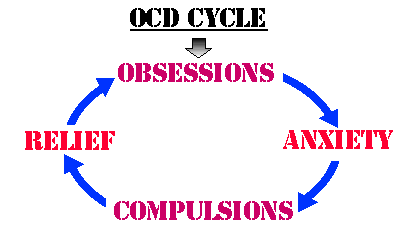Obsessive Compulsive Disorder is a very misunderstood illness. It's not as discussed or as frequently occurring as other mental disorders such as depression and anxiety, it isn't portrayed often or well in most media, it's joked about and used for fashion, and it's ruining my life. OCD affects 3.3 million people in the United States, and it desperately needs understanding. In fact, being surrounded by people who don't comprehend the seriousness or reality of OCD can be detrimental to treatment.
Target faced backlash last year for selling this shirt making light of a serious condition, and they're only one of many companies to do so.
Popular misconceptions of this illness include constant hand washing, rechecking stoves and locked doors, and being incredibly organized. While sometimes these can be symptoms people experience, OCD is a lot more than that. There are four main categories (Checking, Hoarding, Contamination, Intrusive Thoughts), and within those can be countless symptoms. An OCD sufferer has certain anxieties/triggers regarding certain situations, then they feel the need to perform a compulsion to lessen the anxiety. Example: They fear they forgot to lock a door, so they keep checking it. They fear they have contracted a serious disease by touching a public computer, so they wash their hands. Sometimes, instead of compulsions, they may avoid something, which is just as damaging. Example: They keep the door locked all the time and exit somewhere else, like a garage, or have someone else lock the door. They wear gloves to touch a public computer, or thoroughly sterilize it first. Both compulsions and avoidance feed into the monster that is OCD and ultimately do more harm.
"Glee" had its ups and downs handling a character with OCD, but it's one of the better jobs I've seen. Emma Pillsbury suffered from contamination-based OCD.
Another misconception is that you can tell if someone has it. Really, nobody "looks" like they have OCD, just as nobody looks like they have most other physical or mental illnesses. There's no set type of person who could have it – it's open to any gender, age, ethnicity, background, literally anything. Sometimes it appears in childhood, sometimes it bears its head in early adulthood, oftentimes it is induced by a trauma of some sort.
A lot of OCD symptoms/compulsions may go on without notice, whether because they are mental or because compulsions do not arise in situations where you observe them. People can hide their compulsions for even years without others noticing.
One of the few accurate portrayals of OCD seen on TV
A very important thing to note is that OCD absolutely not quirky or just a silly habit. At best, it's obnoxious and irritating to the sufferer and those around them. At worst, it's utterly debilitating and dangerous. Left unchecked, OCD can increasingly complicate your life, and each person has a drastically different experience.
There are also varying types of contamination fears, ranging from contracting diseases, spreading dirty/inappropriate thoughts, or a general disgust (which is what I have). I've read about one girl who kept her clothing in plastic bags within her dresser for fear of contamination from the air. There are people who won't kiss but will shake hands, people who will use public restrooms but not touch doorknobs, people who will roll around in dirt but not touch a certain object if they've had a “bad" thought while handling it.
OCD is very difficult for many people to comprehend, especially because no two OCD sufferers are the same. And even one person is a lot to understand. The thing about OCD is you usually know that your feelings and compulsions don't make sense, but you feel them strongly regardless. Your brain literally perceives the world differently than most people, and some things just set off more of an alarm.
There are a few treatments for OCD, including SSRI medications, but the best treatment is something called “Exposure and Response Prevention" therapy, which essentially forces you to face your fears. The idea is that over time, you expose yourself to triggering situations and then not allow yourself to carry out your compulsions, sitting with the discomfort until eventually, it makes you less anxious. So perhaps you touch a doorknob, but then you don't perform your hand washing ritual. It's terrifying and it sure drives you crazy, but after a while of repeating that process, your anxiety levels come down and you realize nothing bad is going to happen. Unfortunately, your compulsions will probably never fully go away, but you have to fight back and not give in, otherwise they take you over.
To treat OCD, this cycle must be broken at the point of compulsion, otherwise it repeats forever. Compulsions provide only temporary relief.
ERP is the most terrifying thing someone with OCD can go through. Imagine your biggest fear – clowns, heights, failing a test, whatever it may be. Let's say you're absolutely horrified by spiders. Imagine that you have to climb into a tank full of spiders, let them crawl all over you, and you can't get out of the tank or take them off of you. You must sit and let them climb around on you, over and over, day after day, week after week.
One could write pages upon pages trying to explain OCD- the science behind it, medicines that can help, my experience with it, how it may evolve- but these are the basics. I hope I've been able to give you a little insight into this incredibly serious mental illness, and that you will be more sympathetic to anyone who suffers from it. I have had people make fun of me for it, and it's a real stab to the heart. People with OCD have absolutely no control over what spikes their anxieties, the compulsions they feel they must perform, and the thoughts that consume them. Every single person who suffers from OCD is so unbelievably strong. It is no easy feat even to get through daily activities. For sufferers, it's almost incomprehensible to imagine life without the burden of Obsessive Compulsive Disorder, but it's a life they may dream about all the time.























